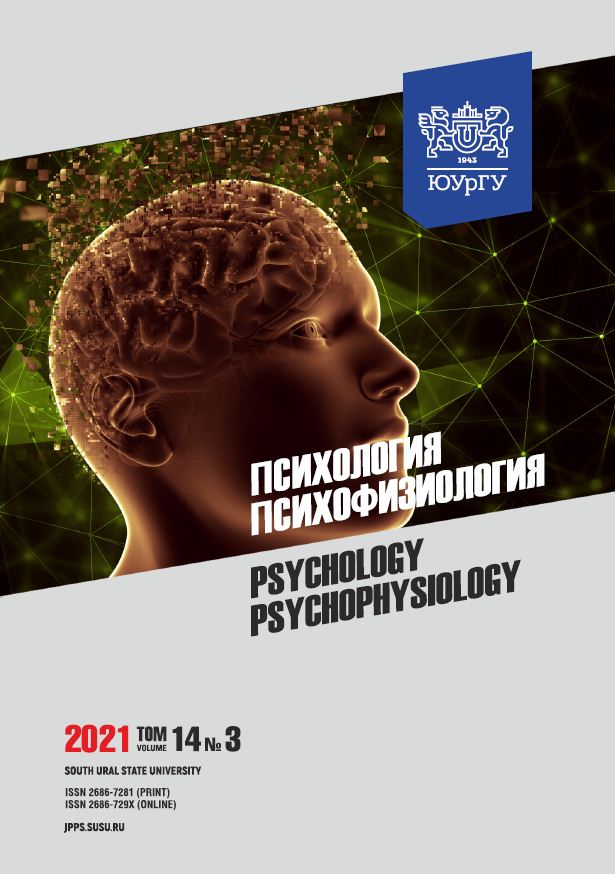EMOTIONAL INTELLIGENCE AS A RESOURCE FOR CREATIVE LEADERSHIP
Abstract
Abstract. Modern approaches to leadership can be roughly divided into leadership in situations of stability and instability. Leadership in situations of instability implies both the specific properties of emotional intelligence and creative social identity. Most research is focused only on the relationship between leadership and emotional intelligence but does not pay enough attention to the social identity of a leader. Aim. The paper aims to reveal the differences in the expression of the components of emotional intelligence in leaders and ordinary group members depending on the presence or absence of identity with the creator role.
Materials and methods. An experimental situation was created that simulated the uncertainty of assessment in competitive learning activity. The method of ROSSTL by V.G. Gryazeva-Dobshinskaya et al. was used for the assessment of social-role identity. The sociometry method by J.L. Moreno was applied to identify leaders in the group. The method of D.V. Lyusin was used for the assessment of emotional intelligence of leaders and group members. The groups were compared with the Mann–Whitney U test. Results. Leaders with the creator role in their social-role identity are able to better understand and manage emotions of their group members. Group members with the creator role in their social-role identity are able to better manage their own and others' emotions. Conclusion. The features of emotional intelligence of leaders and group members with different levels of the creator role in their social-role identity were found.
Downloads
References
2. Gryazeva-Dobshinskaya V.G. Innovative leadership: modeling of managers activity tendencies of the enterprise. Vestnik YuUrGU. Seriya: Psikhologiya = Bulletin of the South Ural State University. Series: Psychology. 2010; 17 (193): 9–17. (in Russ.). https://www.elibrary.ru/item.asp?id=15181870
3. Gryazeva-Dobshinskaya V.G., Dmitrieva Yu.A., Markina N.V. Transformational leadership and managers strategic management settings. Vestnik Moskovskogo gosudarstvennogo oblastnogo universiteta = Bulletin of the Moscow State Region University. 2018; 3: 111–133. (in Russ.). DOI 10.18384/2224-0209-2018-3-915.
4. Banks G., McCauley K., Gardner W., Guler C. A meta-analytic review of authentic and transformational leadership: A test for redundancy. Leadership Quarterly. 2016; 27: 634–652. DOI: 10.1016/j.leaqua.2016.02.006
5. Tajfel H., Turner J.C. An Integrative theory of intergroup conflict. W.G. Austin, S. Worchel (Eds.). The social psychology of intergroup relations. Monterey, CA: Brooks/Cole. 1979: 33–47.
6. Hogg M.A., Abrams D., Brewer M.B. Social identity: The role of self in group processes and intergroup relations. Group Processes & Intergroup Relations. 2017; 20 (5): 570–581. DOI: 10.1177/1368430217690909
7. Steffens N.K., Munt K.A., van Knippenberg D. et al. Advancing the Social Identity Theory of Leadership: A Meta-Analytic Review of Leader Group Prototypicality. 2020. DOI: 10.31234/osf.io/b94qs
8. Belinskaya E.P. Modern identity studies: from structural certainty to procedural incompleteness. Vestnik Sankt-Peterburgskogo universiteta. Psikhologiya i pedagogika = Vestnik of Saint Petersburg University. Psychology. 2018; 8 (1): 6–15. DOI: 10.21638/11701/spbu16.2018.101
9. Epitropaki O., Kark R., Mainemelis C., Lord R.G. Leadership and followership identity processes:
A multilevel review. The Leadership Quarterly. 2017; 28 (1): 104–129. DOI: 10.1016/j.leaqua.2016.10.003
10. Harms P.D., Credé M. Emotional intelligence and transformational and transactional leadership: A meta-analysis. Journal of Leadership & Organizational Studies. 2010; 17 (1): 5–17. DOI: 10.1177/1548051809350894
11. Sosik J.J., Megerian L.E. Understanding leader emotional intelligence and performance: The role of self-other agreement on transformational leadership perceptions. Group & Organization Management. 1999; 24 (3): 367–390. DOI: 10.1177/1059601199243006
12. Larina A.T. Emotional intellect. Azimut nauchnykh issledovanii: pedagogika i psikhologiya = Azimuth of scientific research: pedagogy and psychology. 2016; 3 (16): 275–278. https://elibrary.ru/item.asp?id=27192531
13. Lyusin D.V. Modern ideas about emotional intelligence // Social Intelligence. Theory, measurement, research / ed. D.V. Lyusin, D.V. Ushakov. M.: Institute of Psychology of the Rus-sian Academy of Sciences. 2004: 29–36. (in Russ.). https://elibrary.ru/item.asp?id=2007976
14. Lyusin D.V. A new technique for measuring emotional intelligence: the EMIN questionnaire. Psikhologicheskaya diagnostika = Psychological diagnostics. 2006; 4: 3–22. (in Russ.). https://www.elibrary.ru/item.asp?id=26114976
15. Gryazeva-Dobshinskaya V.G., Bakunchik N.Yu., Glukhova V.A., Maltseva A.S. Method of diagnostic of social subjects relations to creative person. Vestnik YuUrGU. Seriya: Psikhologiya = Bulletin of the South Ural State University. Series: Psychology. 2008; 33 (133): 33–45. (in Russ.). https://www.elibrary.ru/item.asp?id=12948766
References on translit
-Copyright (c) 2022 Psychology. Psychophysiology

This work is licensed under a Creative Commons Attribution-NonCommercial-NoDerivatives 4.0 International License.



